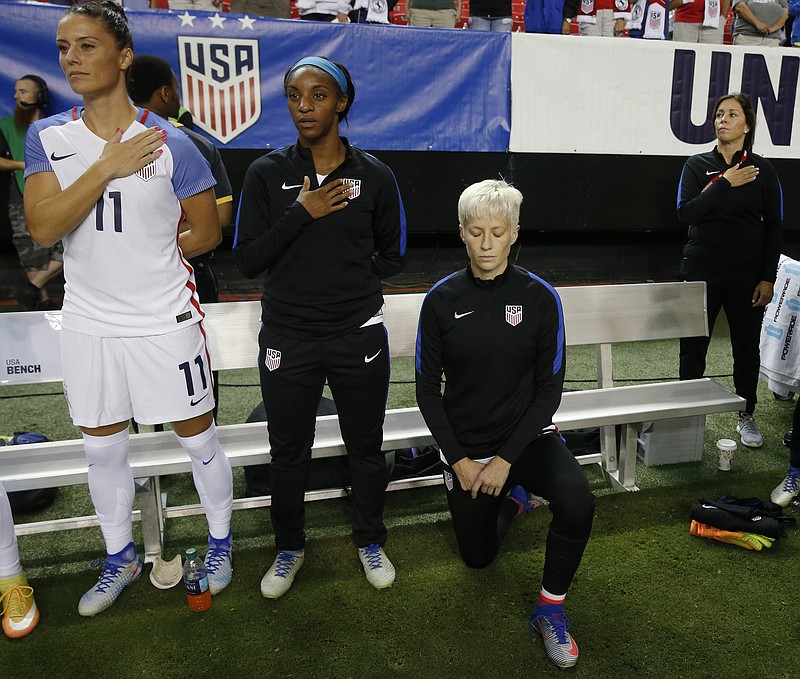I've always been a sucker for "The Star-Spangled Banner," especially since the Sept. 11, 2001, terrorist attacks. I'm intensely proud of my country and the opportunities it has given me - probably far more than I deserved.
So I always stand when it's played. I also always try to put my right hand over my heart and remove any cap or hat from my head, as well as hoping that whoever is singing it shows the national anthem proper respect and dignity rather than turning it into some over-the-top personal artistic statement.
And because of that, my initial reaction to this past weekend's news that the U.S. Soccer Federation has adopted a new policy stating, "All persons representing a Federation national team shall stand respectfully during the playing of national anthems at any event in which the Federation is represented" was one of joy and patriotic pride.
After all, U.S. national women's team midfielder Megan Rapinoe - who chose to kneel during a couple of national team matches last year as a sign of support for former San Francisco 49ers quarterback Colin Kaepernick's earlier decision to do the same to bring attention to racial inequality - isn't representing only her views in a U.S. team match. She represents her country, which treats her pretty well for her time in a red, white and blue soccer uni.
So my initial thoughts over Rapinoe's earlier actions were that if she wants to make a personal statement during the anthem while competing on her women's pro league team of choice, and that team has no objection, have at it. But not when she's representing me.

And to her credit, the prepared statement Rapinoe issued through her agent on Monday sort of, kind of sounded as if she somewhat agreed with Policy 604-1, noting, "It is an honor to represent the USA and all that we stand for - to be able to pull on the red, white and blue to play a game that I love. I will respect the new bylaw the leadership at USSF has put forward."
"That said," she added, "I believe we should always value the use of our voice and platform to fight for equality of every kind."
And that's where embracing an anthem over an ideal gets tricky. While patriotism is a good thing, blind loyalty to the state, even a democratic state, flies in the face of everything this great nation was founded upon.
That's not to say we shouldn't somewhat question Rapinoe's decision to honor Policy 604-1 or hugely question Kaepernick's new stance to stand for the anthem this season if another team is willing to sign him.
After all, this is the same Kaepernick who announced last summer that "I am not going to stand up to show pride in a flag for a country that oppresses black people and people of color. To me, this is bigger than football and it would be selfish on my part to look the other way."
He also said: "To me, (people being oppressed) is something that has to change, and when there's significant change - and I feel like that flag represents what it's supposed to represent, and this country is representing people the way it's supposed to - I'll stand."
Not to question Kaepernick's sincerity or tenacity, but does anyone think great strides have been made on the racial front in this country in the past six or seven months? Does anyone expect our racial divide to noticeably shrink between now and September, when the NFL season begins anew?
Yet Kaepernick also can't put his money where his mouth is for all his charitable projects - and he's more socially conscious than many in his tax bracket - if he has no money. He needs a job, which is one way of saying that you sometimes live to fight another day.
The same could be said for Rapinoe. The national attraction to women's soccer pretty much remains with the national teams - both World Cup and Olympics. It's not yet paying anything remotely close to David Beckham bucks to its National Women's Soccer League players, though the NWSL has finally landed a "Lifetime" television contract for 2017.
Still, the 31-year-old Rapinoe's security blanket is U.S. national soccer, and U.S. national soccer only.
Yet to return to the final portion of her Monday statement, it's also difficult to argue with her assertion that "we should always value the use of our voice and platform to fight for equality of every kind."
It's not easy to defend the unpopular, and there are few things that understandably enrage the majority of Americans more than appearing to disrespect our national anthem.
But ask yourself this: Could anything more strongly show the rest of the world our commitment to individual freedom of expression than to allow one or more of our U.S. national team members to stage a personal protest during our anthem? Just a thought.
Contact Mark Wiedmer at mwiedmer@timesfreepress.com.
